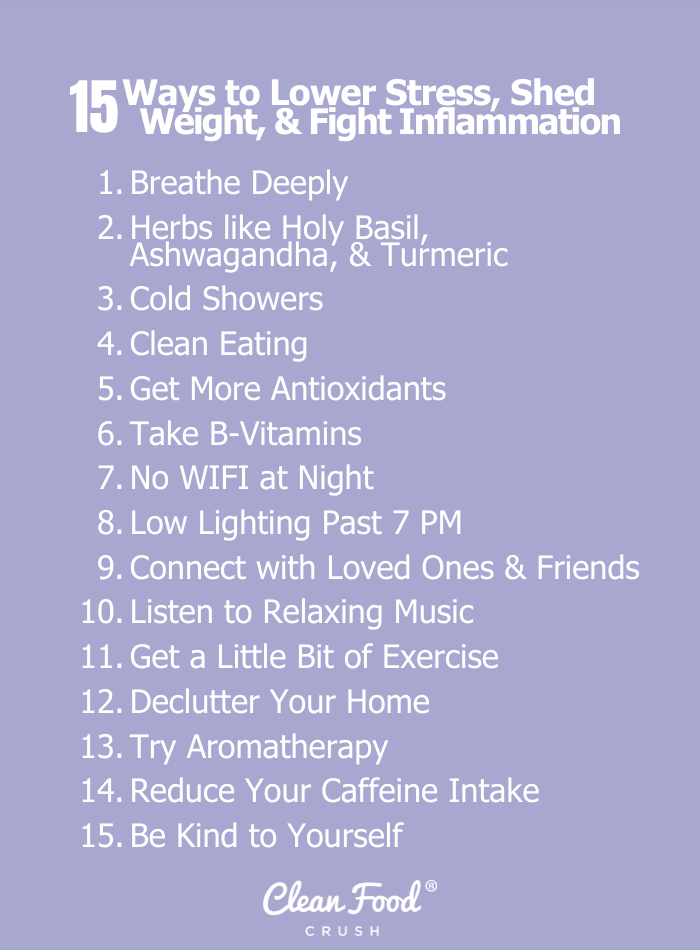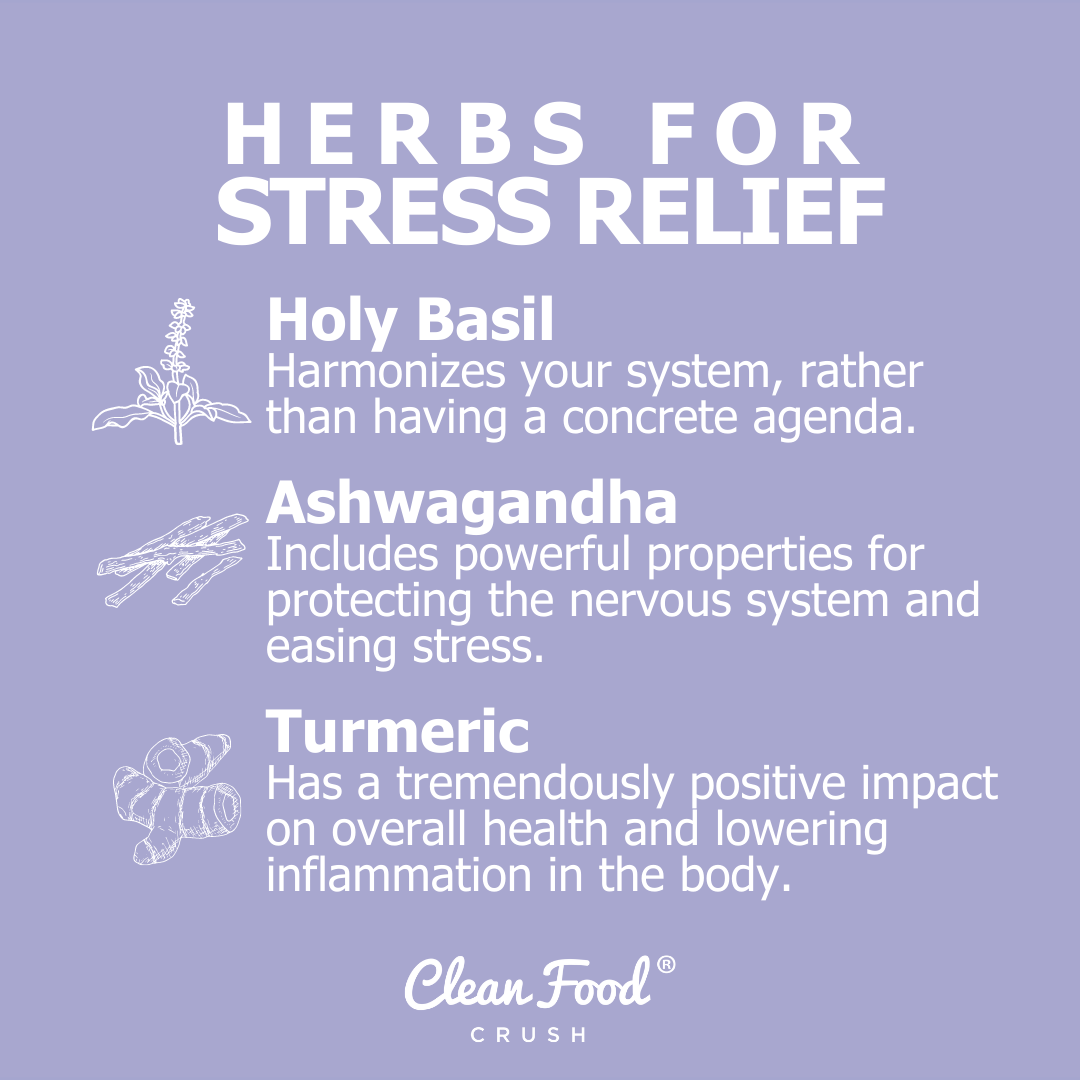This post contains affiliate links. Please see our disclosure policy.

15 Ways to Naturally Lower Stress to Shed Weight and Inflammation
Our bodies are sensitive and intricate systems! And when stress hits, we have to raise our TLC levels to stay in balance. Acne, weight gain, skin outbreaks, inflammation and joint pain are all ways the body can react to an overload of stress. If you feel bloated, carrying excess water weight, and inflamed, these 15 tips can help you naturally reduce your stress levels and inflammation.
Shedding weight is really just the result of the body being in balance, so in this article, we’re going to focus on ways to lower stress, anxiety, and inflammation. It’s safe to assume that by bringing these things into balance, your body will feel safe to let go of water weight and begin to heal.

Breathe Deeply
Breath is one of the most natural ways to self-soothe and lower stress levels in the body in just minutes. When we breathe deeply, we’re also lowering our heart-rate and reducing inflammation while increasing relaxation.
There are two methods you can try today:
- Visualization with Breath:
As you breathe deeply, inhaling and exhaling through the mouth, visualize stress coming from your body’s extremities and localizing in your chest. As you exhale, imagine all of that stress and tension leaving your body and evaporating. You may even like to visualize a golden light coming back into your body each time you exhale the stress.
Studies have proven that practicing visualization is a powerful tool for perfecting skills and reducing anxiety. Spend 3-10 minutes with this breath and notice the shift in how you feel.
- 4-7-8 Breath Method:
Inhale for 4 seconds, hold for 7, exhale for 8. This method is incredibly simple and calming for the mind and nervous system. You can practice this method for as little as 3 minutes to experience relief.
The 4-7-8 breath method can also help to boost your energy, so try this out if you’re experiencing an afternoon slump and don’t have time for a nap.

Herbs like Holy Basil, Ashwagandha, and Turmeric
Holy basil is an adaptogenic herb, meaning it will work on harmonizing your system with where it’s at, rather than having a concrete agenda. Some herbs will simply lower or raise various hormone levels in the body, while adaptogens do what’s needed to come into balance.
Holy basil is praised for its ability to help ease symptoms of stress, anxiety, and inflammation. It contains high levels of antioxidants and also has antibacterial and antimicrobial properties making it complementary to most healing protocols. You can prepare it as a tea to drink 3 times a day or consume it in capsule form.
Ashwagandha is an herb with powerful properties for protecting the nervous system and easing stress, anxiety, and inflammation. This herb is finding itself under the spotlight now as more studies determine it may be as beneficial as some pharmaceutical counterparts for fighting stress and possibly even healing the nervous system of damage. Ashwagandha can also be taken in tea, capsule, or liquid tincture form.

Turmeric, the most well-known herb for fighting inflammation, is also a natural stress reliever due to the compound curcumin. It has a tremendously positive impact on overall health and lowering inflammation in the body. You can cook with turmeric; however, you’ll need to take it in much higher doses to benefit from its medicinal properties. Turmeric is best taken in capsule form when you’re aiming for stress and inflammation relief.

Cold Showers
Before you roll your eyes and say heck no, hear me out on this one. Cold showers have been used for a long time by athletes and other high performers to lower inflammation and repair the body. Taking a very cold shower works by creating constriction in your veins, which removes unwanted toxins from your bloodstream. This acts as a flush for your entire system, providing nutrient-rich blood to your body.
Cold showers also cause the body to release endorphins, the happy hormones in our brains that fight off depression and bad moods. Cold therapy has been shown to have a positive impact on inflammation, joint pain, and arthritis. You might also benefit from reading this report by Jack Kruse on Cold Therapy for weight loss and inflammation.
Clean Eating
What we put into our bodies can drastically impact how we feel emotionally and physically. An anti-inflammatory diet is naturally going to help your hormones come into balance while removing excess toxins. Eating Clean helps to eliminate many foods that can clog our detox pathways, increase inflammation and cause our bodies to hold onto water weight. Try this Southwest Chicken + Rice Bowl out asap!
To learn more about Clean Eating, click here to read this Guide to Getting Started with Clean Eating.
Get More Antioxidants
When stress hits, the body reacts by putting the adrenals on overdrive. When your adrenals are overworked, other vitamins and minerals in the body can become depleted. To nourish yourself into balance, put energy towards Clean Eating and consider taking potassium, magnesium, and Vitamin C.

Take B-Vitamins
Increasing your intake of B-Vitamins can improve energy levels and stabilize your mood. They’re commonly known to support the brain and nervous system while reducing agitation and anxiety. You can consume B-Vitamins from food by consuming beans, eggs, fish, chicken, and liver. While organ meats might feel like a stretch, they’re very nutrient-dense and affordable. If the taste just isn’t your thing, you can try blending up organ meat and combining it in with chili or stew. B-Vitamin supplements are also a good option if you’re not sure you’re getting enough from what you eat. You can usually find a quality B-Complex at your local health food or supplement store.
No WIFI at Night
Wifi in the bedroom is distracting and highly disruptive to sleep. If you can, keep the TV and other devices out of your bedroom entirely. Otherwise, make it a point to turn your phone on airplane mode before you go to sleep. Being on your phone or watching TV late at night can prevent your brain from dropping into a deeply relaxed state. Reading before bed is one way to help your brain and nervous system wind down from the day and prepare for a restful night.
Low Lighting Past 7 p.m.
Keeping blue-light out of the home past 7 p.m. will encourage your brain to naturally wind down and begin producing melatonin, the sleep hormone. While blue light wakes you up, red light helps you relax and go to sleep. You can minimize bright lights in the house by installing dimmer switches in your home, using LED-powered candles, and having low lighting or red lights on as it begins to get dark outside.

Connect With Loved Ones and Old Friends
Connecting to people we love is a powerful way to promote a happy and healthy nervous system. They say laughter is the best medicine, and it’s true! Spending time with close friends and family with whom you can be yourself is rewarding on so many levels. Humans are wired for connection, and when we’re in the presence of people, we love our bodies, and brains begin to produce oxytocin and other hormones that promote wellness.
Listen to Relaxing Music
Our external environment is constantly impacting us, even if we don’t realize it. Our nervous systems respond to music by either increasing or decreasing heart rate and stress response. Put on relaxing, ambient music when you’re feeling stressed and practice some deep breathing or visualization. Even better, grab a good book and a cup of tea while you listen to soft music and give your entire system a reset!
Get a Little Bit of Exercise
Sometimes, we need a nice brisk walk to relieve some stress and create flexibility in our bodies. Other times, a hot yoga session or a run might be in order. The critical piece here is that you’re listening to your body and working with it rather than pushing against it. If you’re exhausted and in pain, pushing yourself too hard might simply cause your body to go into an even higher stress state. We can overestimate the importance of being gentle with ourselves. Nature is proven to reduce anxiety and depression, so if you have access to a park, a body of water, a forest, or even a field – get yourself there and try walking, breathing, or catching up with a friend or spouse.

Declutter Your Home
You might be thinking, “what does my house have to do with my stress or my weight”? But as we already covered, our external environment is always communicating with us even when we’re not paying attention. Sometimes, a cluttered home or messy bedroom can cause subconscious stress. When we clear out the cobwebs in our homes and bedrooms, we may also be metaphorically clearing stress from our lives. Here are a few tips to follow when decluttering to create a harmonious environment to relax and feel healthy in:
- Consider minimizing extra things from your home that might not be useful to you anymore.
- Donate old clothing that you never wear and freshen up your closet by making it tidy and organized.
- Make sure your bedroom is free and clear of clutter, technology, or items that need storage.
- Your bedroom is a place of rest, so consider keeping only things like your clothing, your bed, soft lighting, fluffy blankets and pillows, a book, and minimal decor in your room.
- Freshening up your bedroom weekly and washing the sheets is an excellent way to keep your home feeling clean and relaxing for you.
Try Aromatherapy
Everyone is different, but typically relaxing scents are lavender, rose, ylang-ylang, peppermint, and chamomile oil. You can add a few drops to a diffuser and keep it in your living space or bedroom or purchase oils that you can use topically. Aromatherapy is a natural way to calm down your system, relieve anxiety, and soothe the mind.
Reduce Your Caffeine Intake
This one can be tough! If you’re hooked on coffee, consider improving the type of coffee you consume by ensuring the beans you use are organic. You may also consider swapping out coffee for Green Tea, which is rich in antioxidants and has healing effects on the nervous system. Green tea also increases serotonin levels and soothes anxiety. And remember to always drink enough water!
Be Kind to Yourself!
This one is by far the most powerful way to help relieve stress, lower inflammation, and help your body release any unwanted weight. How we speak to ourselves matters. Just as we know that visualizing a skill can help us perfect it, our brains and bodies respond to how we talk to ourselves. Practicing self-love and self-care means that we’re honoring ourselves for where we’re at rather than punishing ourselves for not being where we think we should be.
It’s wonderful to have goals, as long as we remember we’re entirely lovable just as we are now too! Here are 6 Reasons Self-love is important.


















